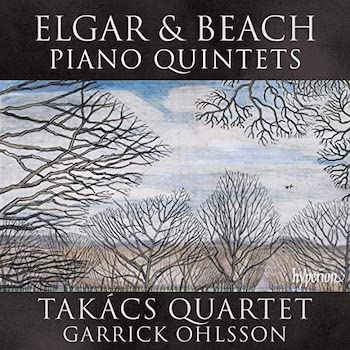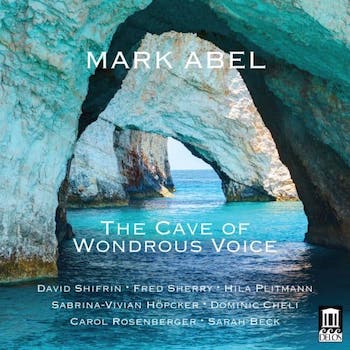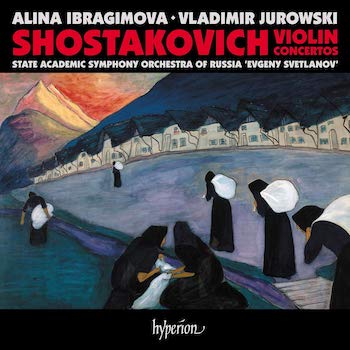Classical CD Reviews: Beach & Elgar Piano Quintets, Mark Abel’s “The Cave of Wondrous Voice,” and Ibragimova plays Shostakovich
By Jonathan Blumhofer
It took more than a century, but Amy Beach’s Piano Quintet has finally got the recording it deserves; it would be hard to beat the all-star lineup featured in The Cave of Wondrous Voice; and ready for some flawless Shostakovich?

It took more than a century, but Amy Beach’s Piano Quintet has finally got the recording it deserves, courtesy of Garrick Ohlsson and the Tákacs Quartet. Written in 1909, Beach’s Quintet is a glorious piece, it’s three movements marked by a mix of rhapsodic lyricism, virtuosity, and lush, late-Romantic chromatic harmony.
The present recording draws out those qualities mightily. Ohlsson’s account of the demanding keyboard writing (Beach was, throughout her life, an acclaimed pianist) is never less than breathtaking, beautifully voiced and brimming with color. He and the Quartet weave in and out of their foreground/background roles in the piece with the utmost naturalness, ably drawing out the subtleties of Beach’s highly motivic writing in the process (the ravishing second movement is a particular highlight).
A similar brilliance of execution marks their reading of Sir Edward Elgar’s epic 1919 Piano Quintet, which rounds out the album. This is a smart pairing: structurally and technically, both pieces have more than a little bit in common, including an elegiac, serious tone even at their most upbeat moments.
Here, Ohlsson and the Quartet deliver taut, cleanly balanced readings of the outer movements (the contrasts between the first’s lean, inward-focused moments and brawny, extroverted ones are conspicuously gripping), while the slow second is radiant: by the end, it’s almost as though the music is glowing from within.
In all, then, a terrific release, wholly satisfying, and timely as ever. To boot: one might hope that this can help nudge the Beach Quintet to its proper place as a cornerstone of the chamber music repertoire.
 One would find it hard to beat the all-star lineup featured in The Cave of Wondrous Voice, a new, hour-long survey of vocal and chamber music by the California-based composer Mark Abel. David Shifrin, Carol Rosenberger, Hila Plitmann, and Fred Sherry headline the album but they’re not its only stars.
One would find it hard to beat the all-star lineup featured in The Cave of Wondrous Voice, a new, hour-long survey of vocal and chamber music by the California-based composer Mark Abel. David Shifrin, Carol Rosenberger, Hila Plitmann, and Fred Sherry headline the album but they’re not its only stars.
There’s a spellbinding performance of Abel’s The Elastic Hours from violinist Sabrina-Vivian Höpcker and pianist Dominic Cheli. It’s arguably the album’s strongest piece, consisting of a pair of movements that thrive on contrasts – of lyrical, folk-like lines and spunky dancing figures, as well as texture, dynamics, and rhythm. Höpcker and Cheli mine them for all they’re worth.
Shifrin and Rosenberger turn in a fluent account of Abel’s amiable Intuition’s Dance, a 10-minute-long curtain-raiser that alternates nimble exchanges for clarinet and piano with dreamy, sometimes reflective passages.
They’re joined by cellist Sherry in Abel’s Trio for Clarinet, Cello, and Piano. Its three movements are generally songful, the parts often active, with a handful of striking gestures mixed into the proceedings (like the col legno cello writing in the finale).
Prior to the Trio, Hila Plitmann sings Abel’s Four Poems of Marina Tsvetaeva. Written for Plitmann, much of the vocal writing takes advantage of the singer’s astonishing upper register. She shines in this performance, in which she’s ably accompanied by Rosenberger and English hornist Sarah Beck.
On the whole, The Cave of Wondrous Voice is smartly played and engineered. Abel’s writing throughout is fluent and often genial. While certain spots in the Trio, particularly, might benefit from grittier moments to offset the diatonic ones, this is music of considerable expressive directness as well as charm.

Ready for some flawless Shostakovich? If so, check out Alina Ibragimova’s new recording of the two Shostakovich violin concertos with the State Symphony Orchestra of Russia “Evgeny Svetlanov” and Vladimir Jurowski: it’s as searing a recording as they come.
In the First Concerto, the Nocturne is brilliantly sculpted; the Scherzo dazzlingly nimble; the Passacaglia a picture of hellish intensity; and the finale a raging, fiery dance. What allows the whole enterprise to take flight is the exceptional attention to musical details Ibragimova and the orchestra demonstrate. Not only are the technical elements – dynamics, articulations, balances, and the rest – perfectly matched between them, but Ibragimova and Jurowski have a feeling for this Concerto’s structure and content that, simply put, feels perfectly right.
As a result, there’s a strong sense of progression through the piece. The Scherzo seems to accumulate weight and grit as it proceeds yet, by the time the kinetic final peroration arrives, it flies with a lightness and resilience that is astonishing. Likewise, the third movement runs the gamut from the sparest of melodic wisps to inferno-like ferocity. The whole performance culminates in a staggering account of the Concerto’s cadenza: hard-hitting, no-nonsense, savage.
If anything, the lesser-known Second Concerto fares even better. True, it’s a more austere piece, slightly shorter, darker, calling for a smaller, less colorful orchestra. But, in Ibragimova’s hands, the piece sings. Indeed, every note counts. The first movement is taut and gripping, marked by a terrific sense of the music’s architecture from violinist and conductor. The central Adagio soars with pure-toned expression, while the finale dances crisply and defiantly.
To be sure, there’s nothing easy about either of these pieces – they visit some pretty bleak places – yet they’ve rarely been better-served on disc than they are here.
Jonathan Blumhofer is a composer and violist who has been active in the greater Boston area since 2004. His music has received numerous awards and been performed by various ensembles, including the American Composers Orchestra, Kiev Philharmonic, Camerata Chicago, Xanthos Ensemble, and Juventas New Music Group. Since receiving his doctorate from Boston University in 2010, Jon has taught at Clark University, Worcester Polytechnic Institute, and online for the University of Phoenix, in addition to writing music criticism for the Worcester Telegram & Gazette.
Tagged: Alina Ibragimova, Amy Beach, Delos, Garrick Ohlsson, Hyperion, Mark Abel
